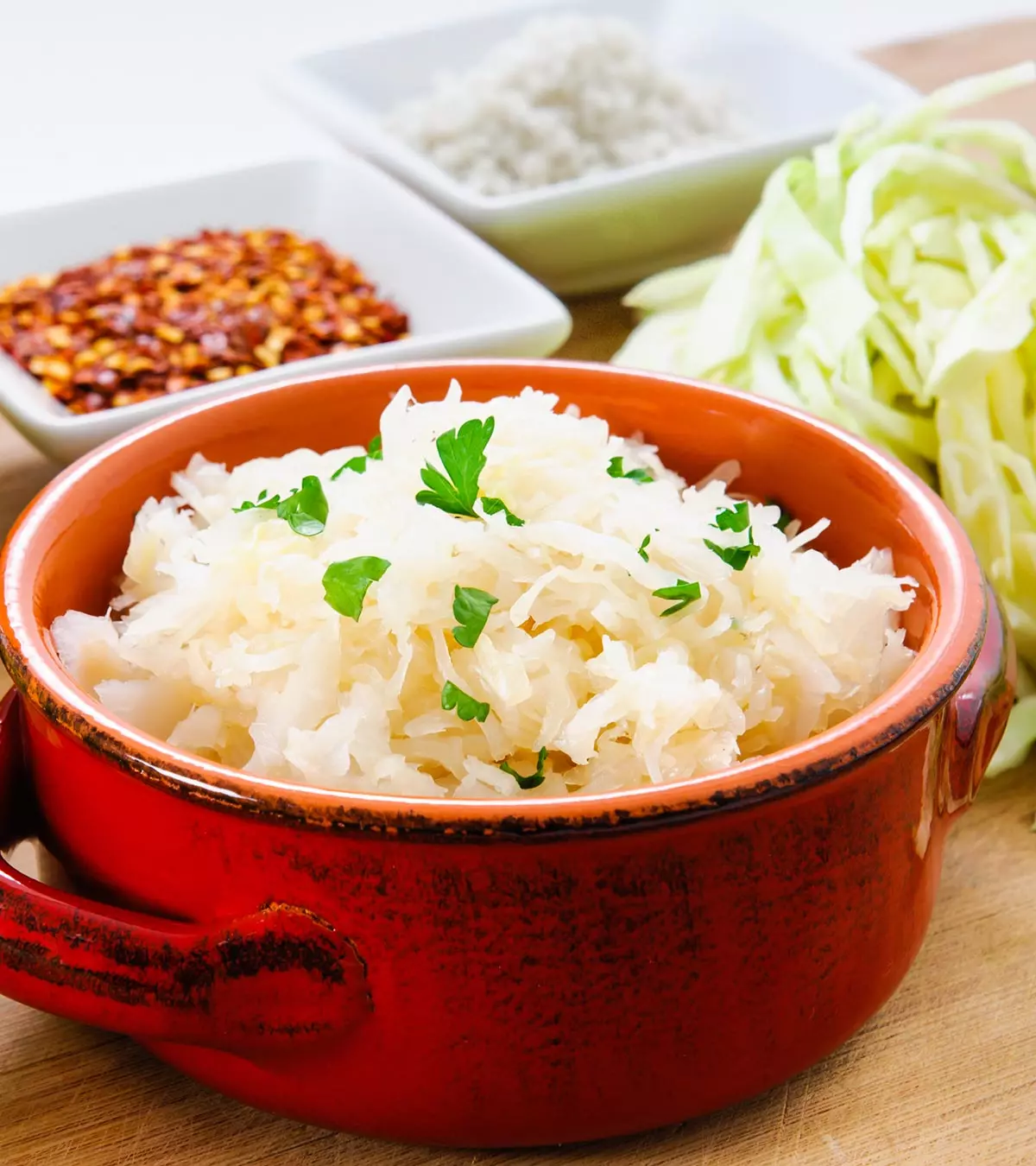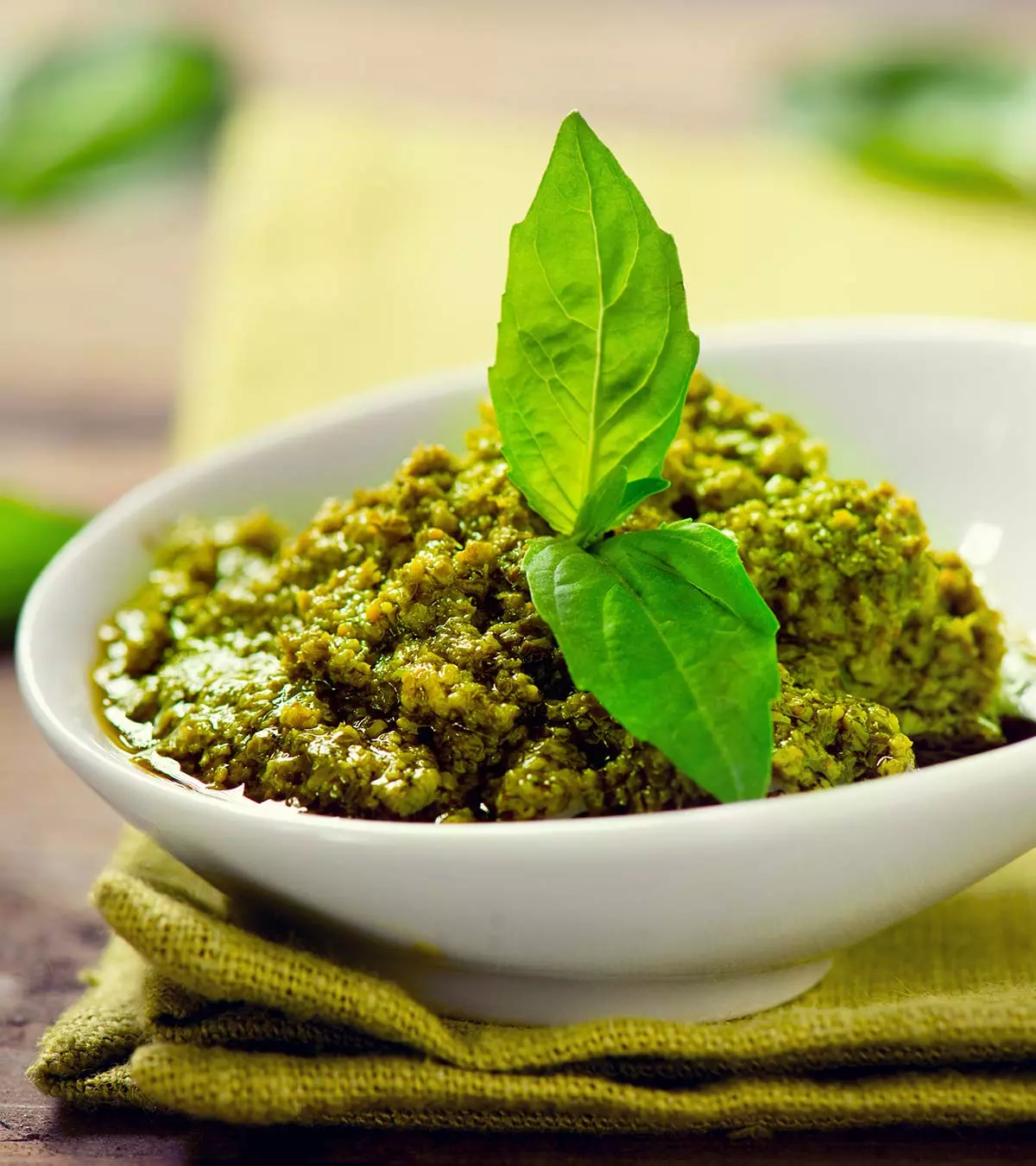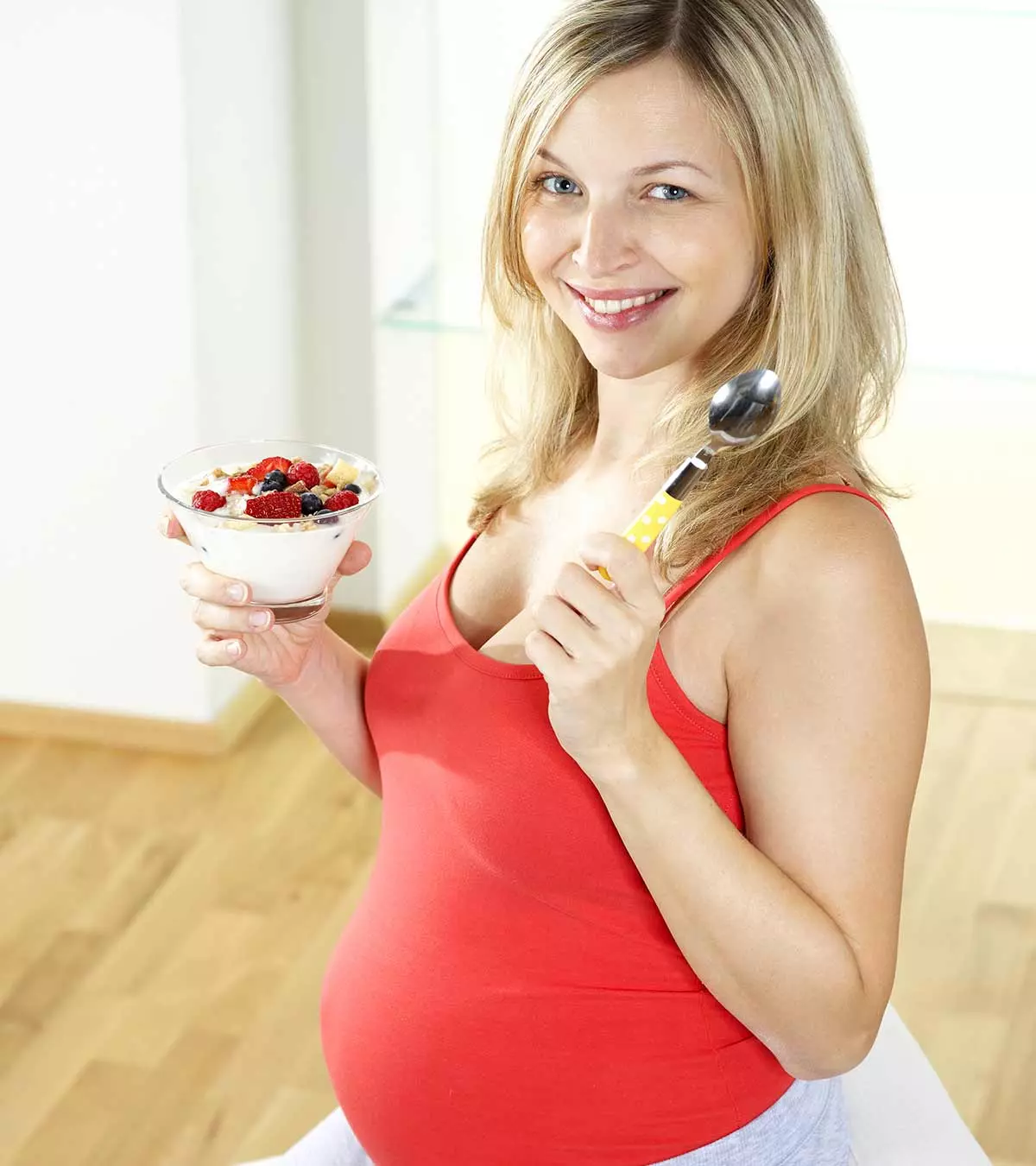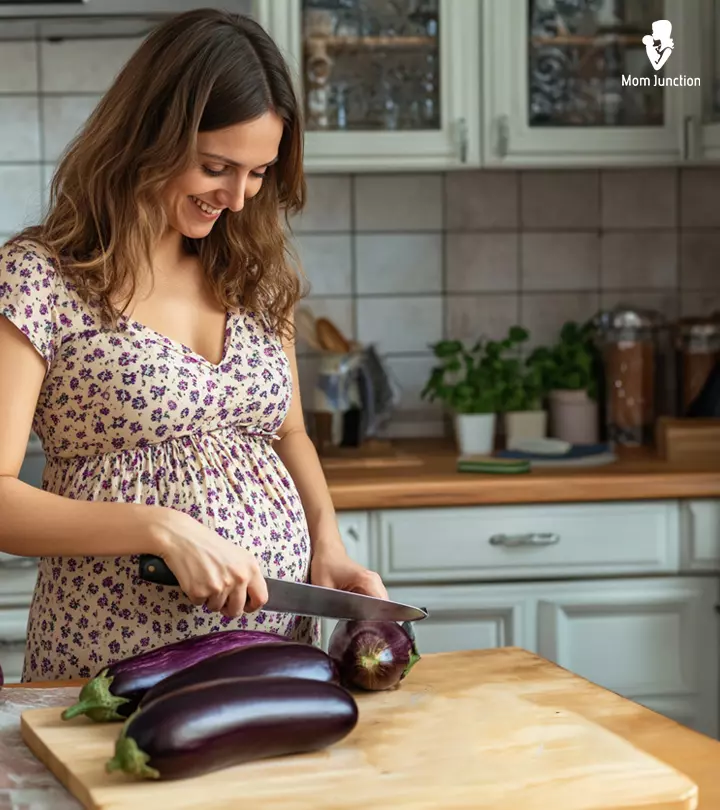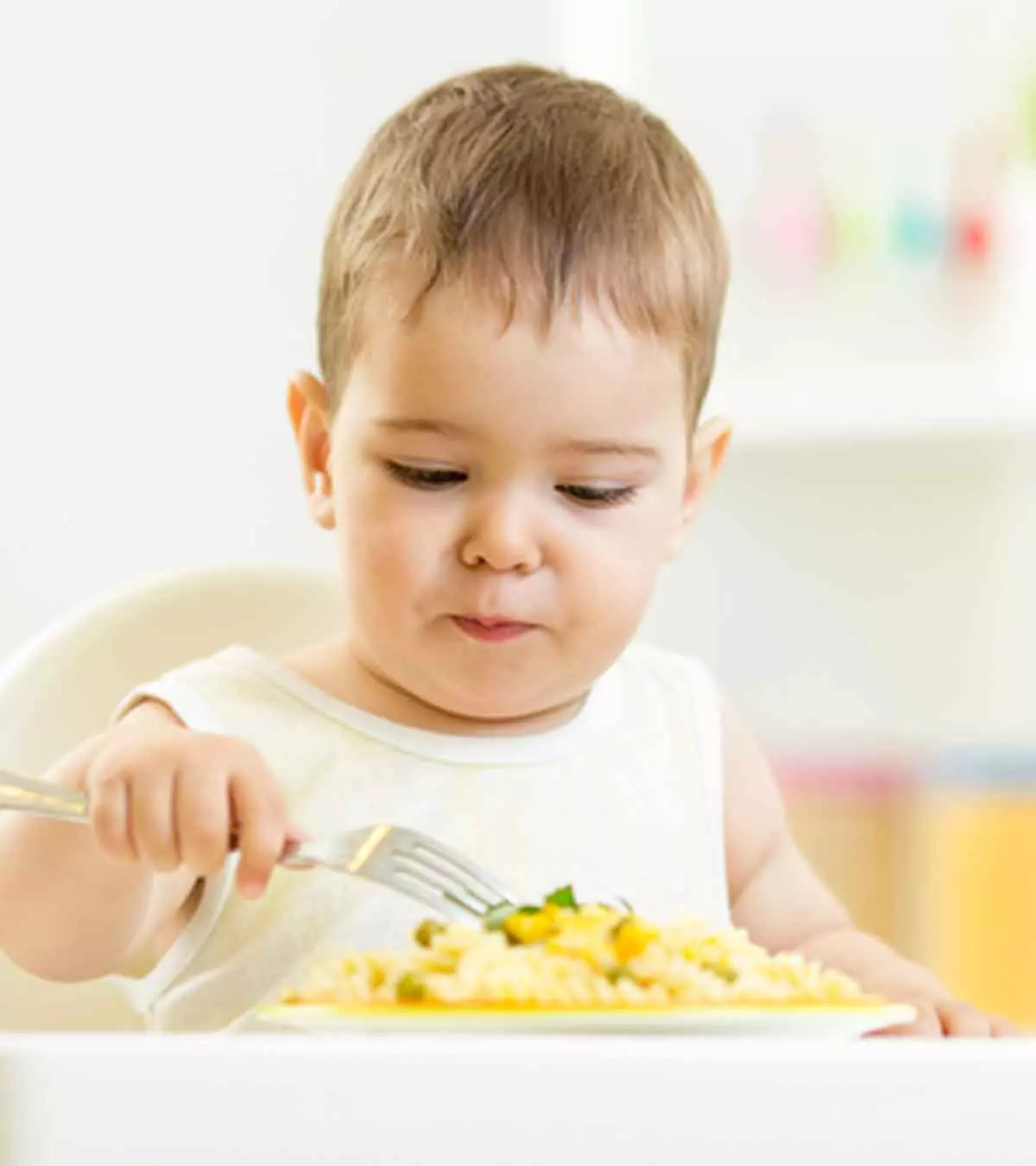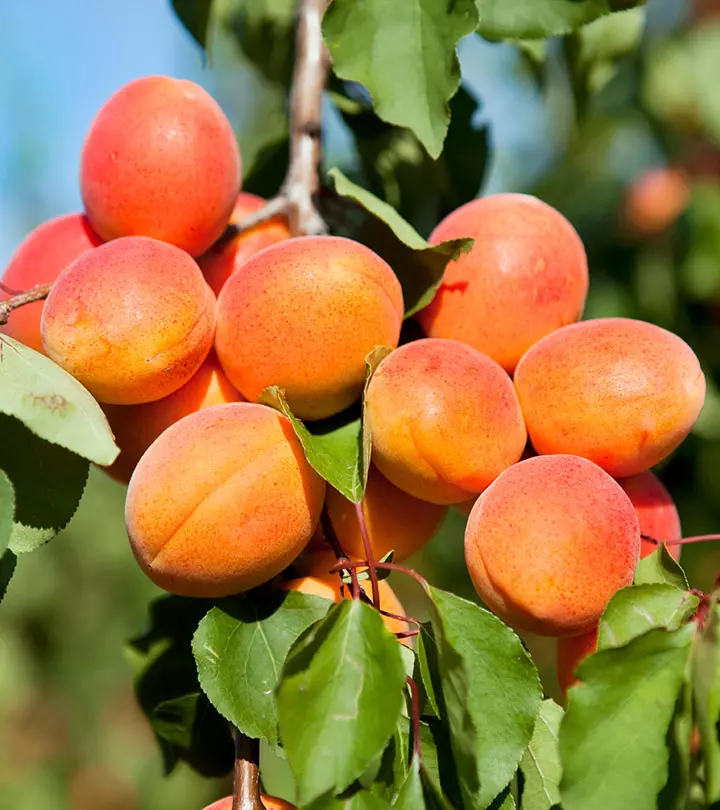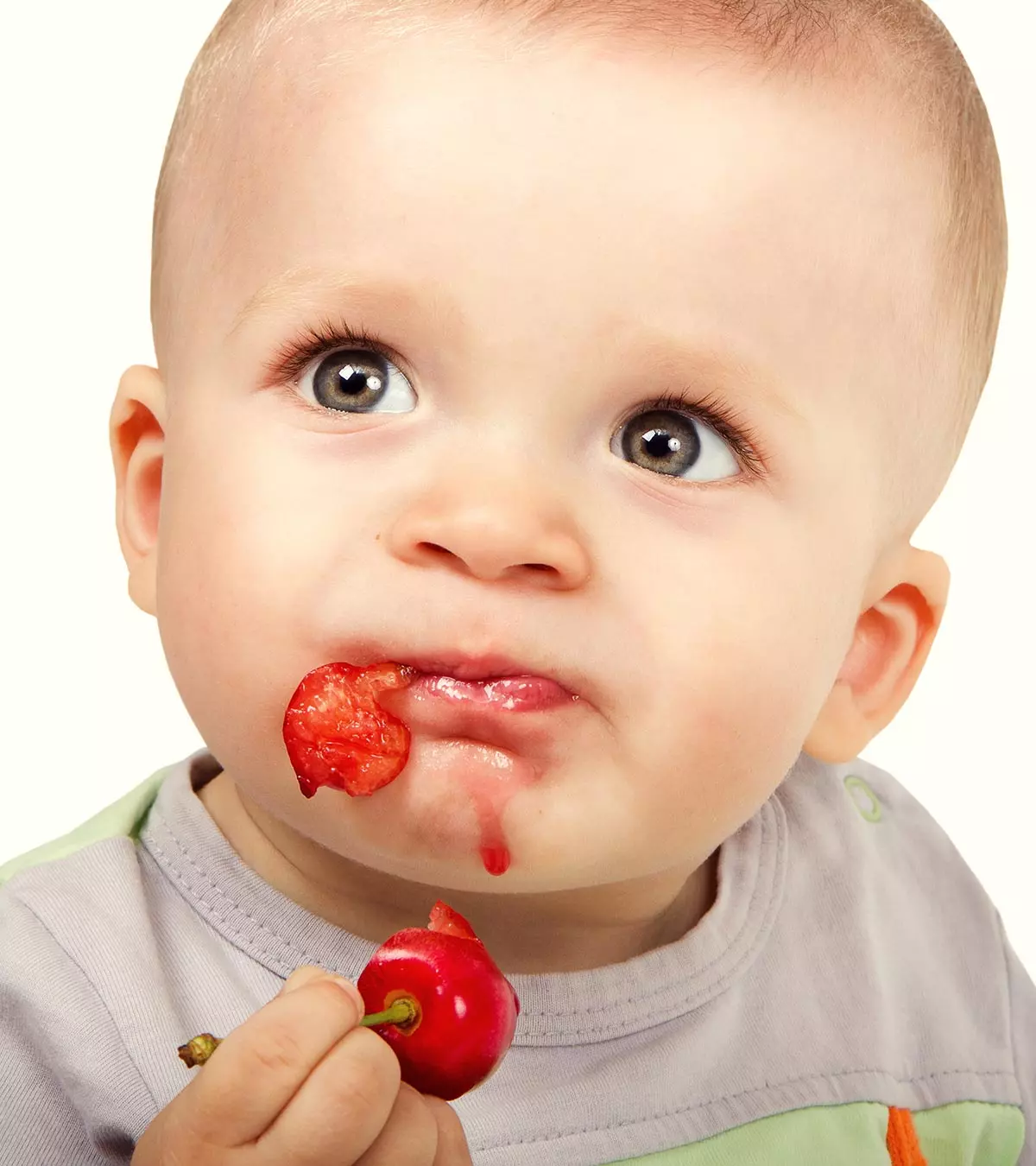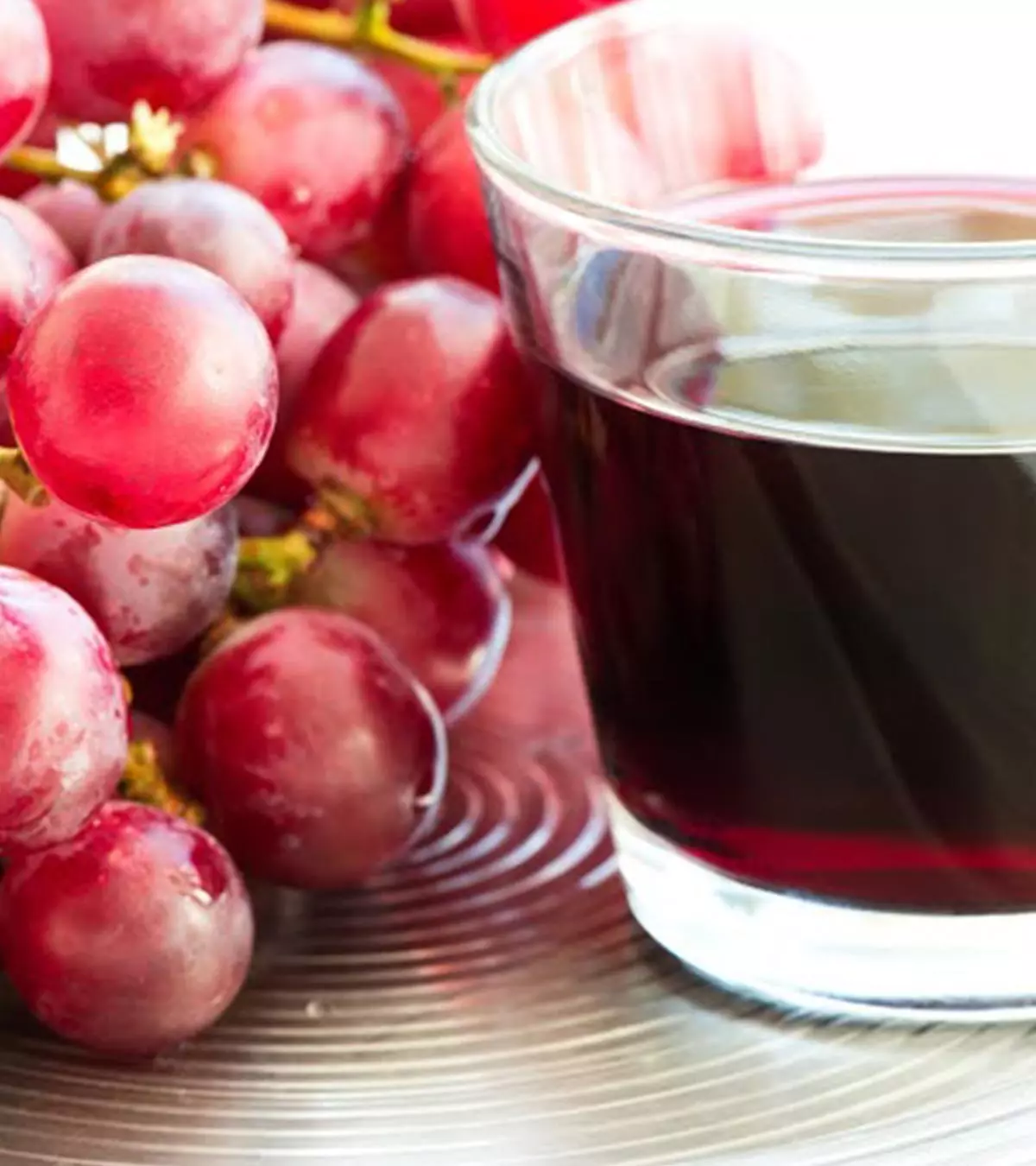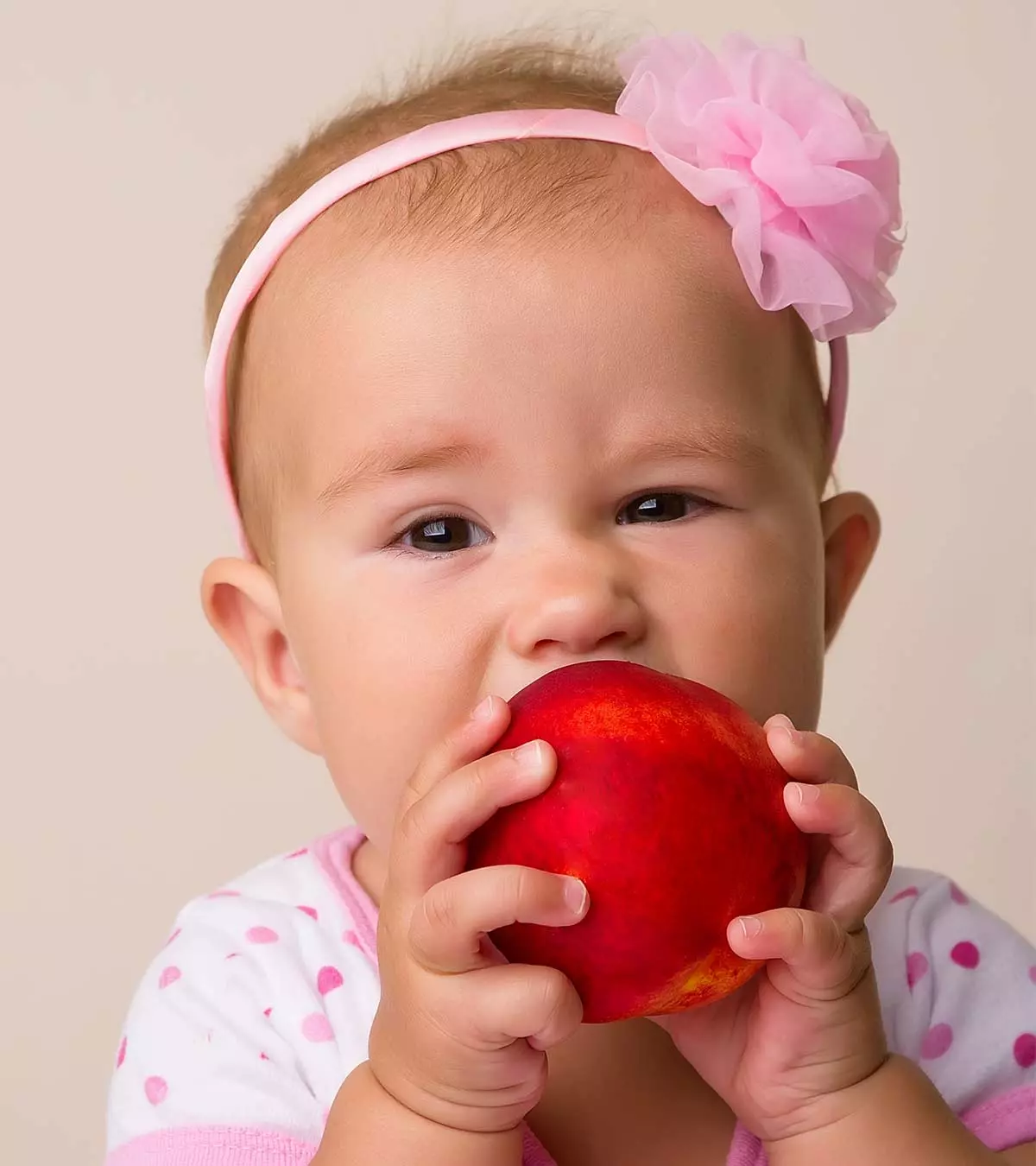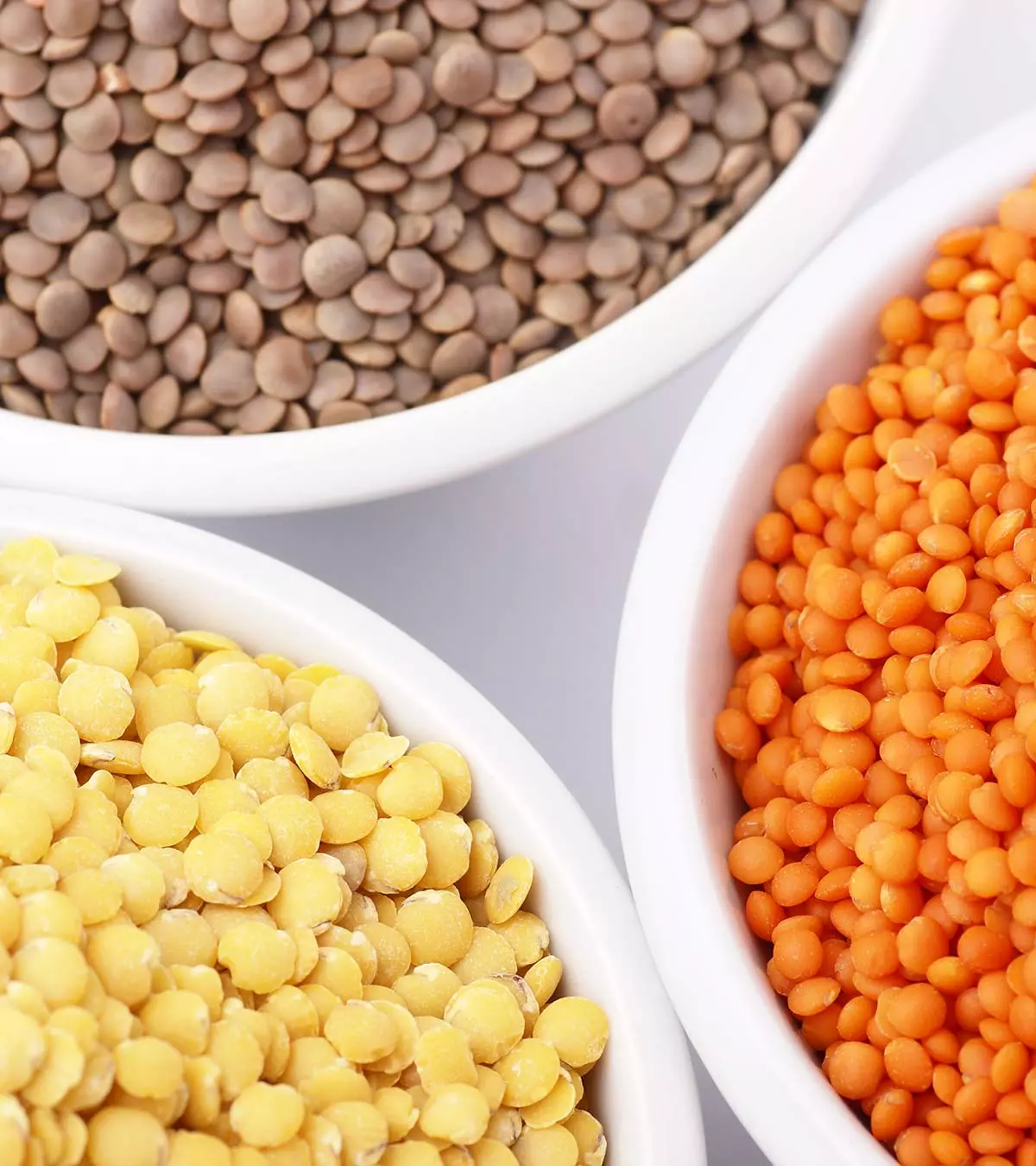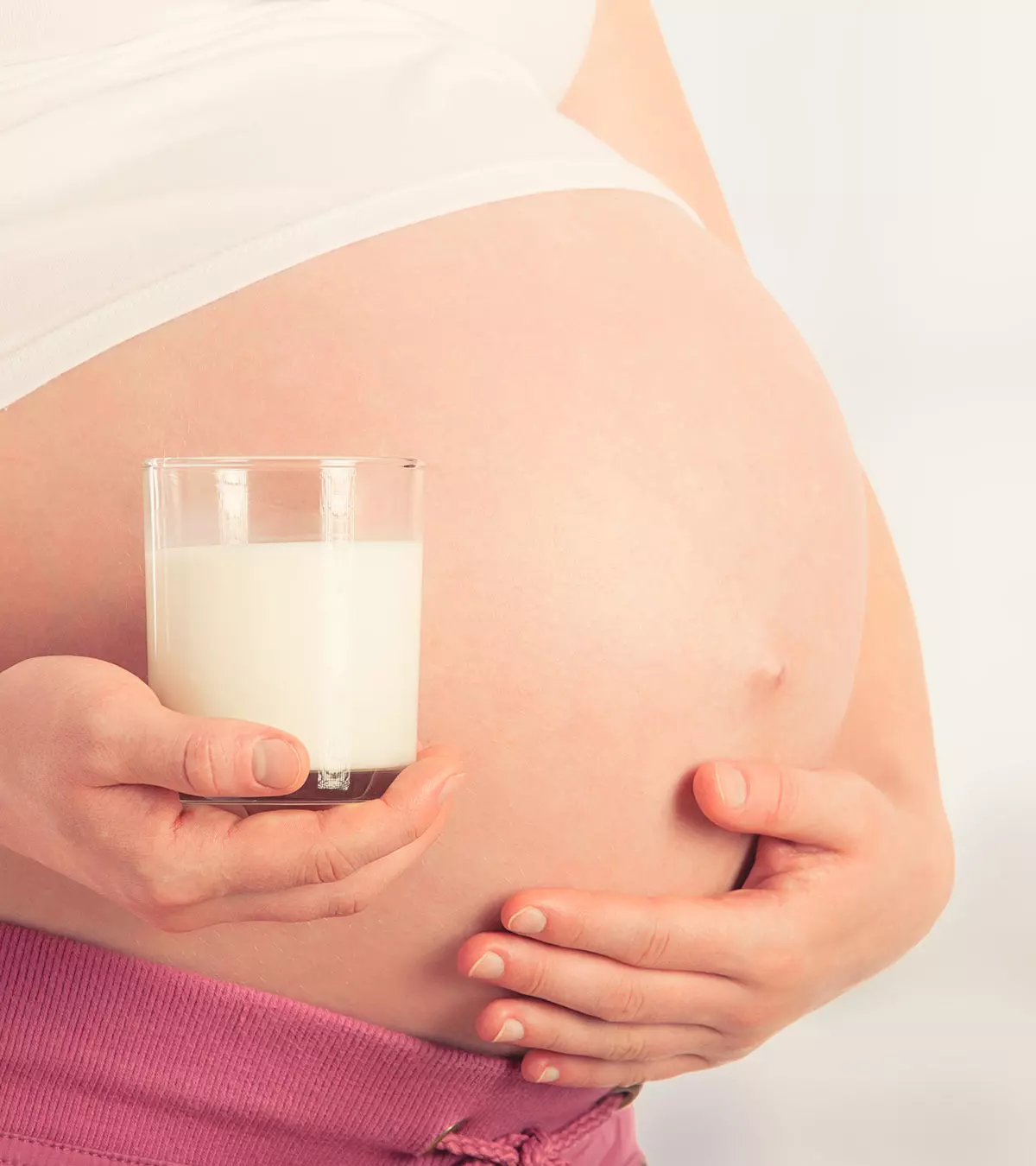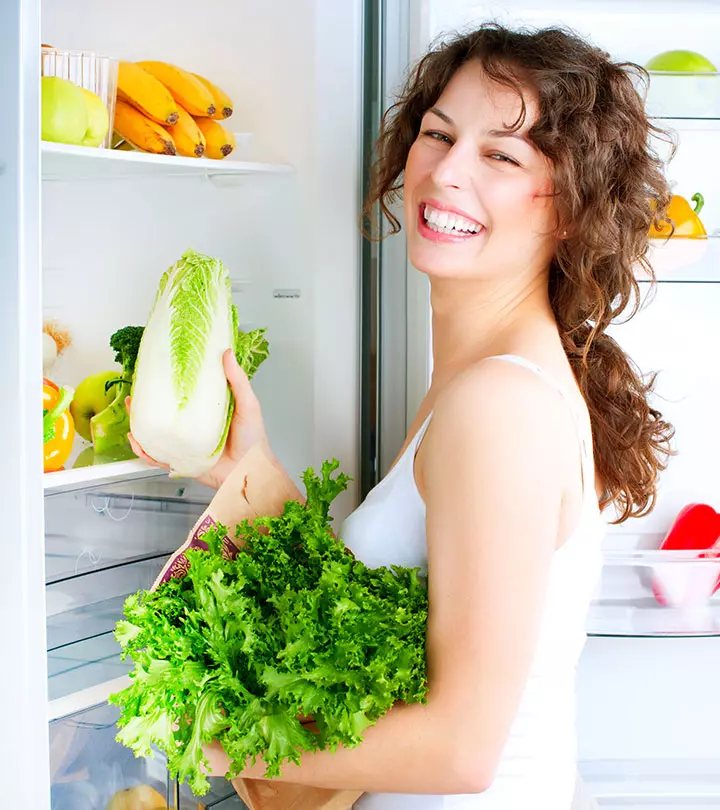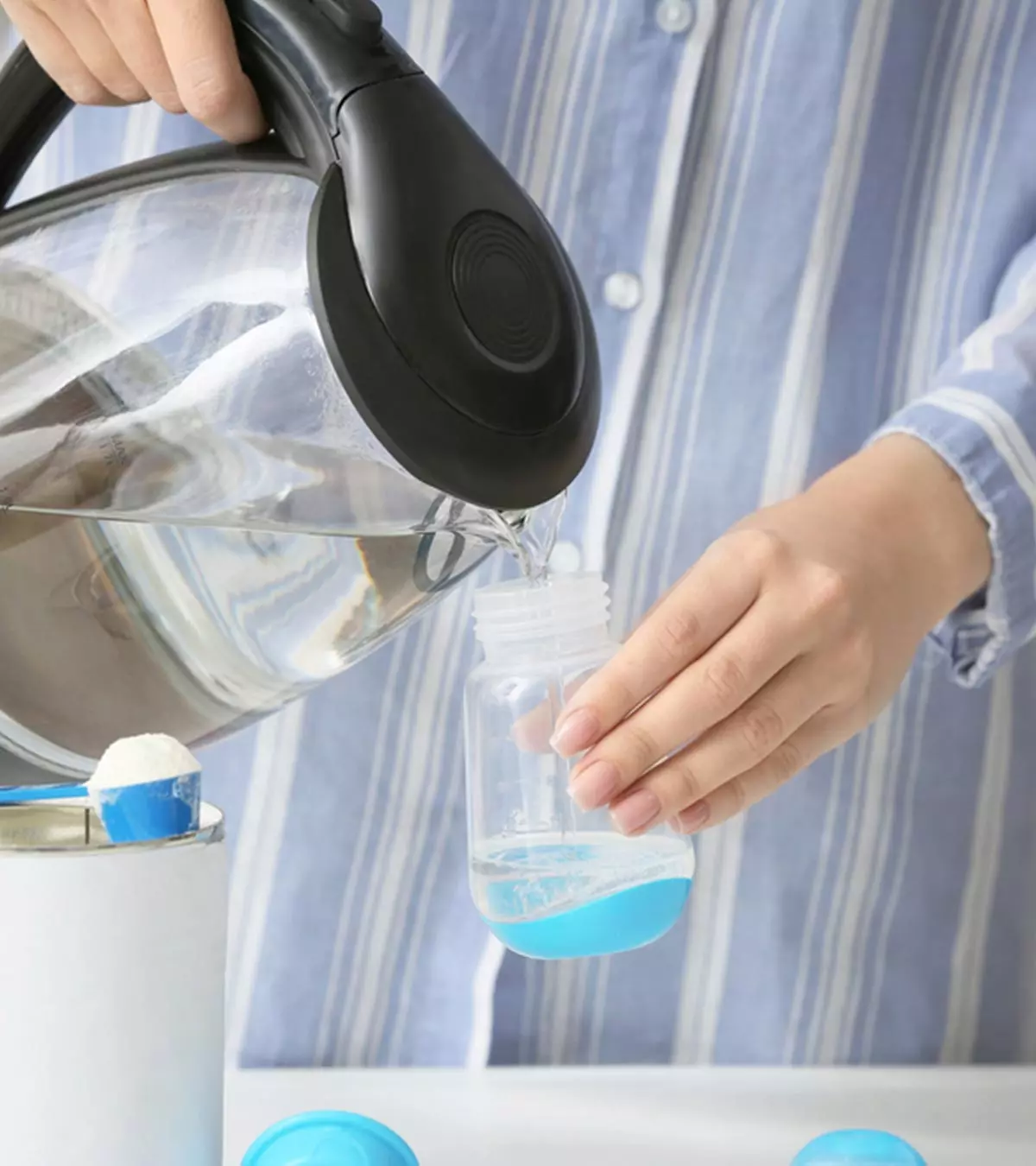
Image: ShutterStock

It is normal for many caregivers and parents to look for the best water for baby formula. Preparing baby formula is a complex process, and selecting the right water to mix can be challenging since many water sources may not be safe for the little ones. Although bottled water or tap water is commonly used to mix infant formula, water quality can be a concern. Contaminants and high mineral content in water can be a health risk for babies.
Read on to know the best water for baby formula and the quality and safety of different water types.
Key Pointers
- You must consider the safety and quality aspects of the water to mix with baby formula.
- Tap water quality is tested by the US Environmental Protection Agency (EPA) in the US. It is considered safe for drinking, and you may prepare formula milk with it.
- If you are unsure about the tap water, you may boil and cool it before preparing formula milk.
- Bottled water may also be used, but make sure to check the sodium and sulfate levels. Distilled water is also a safe alternative.
Can You Use Tap Water To Make Baby Formula?
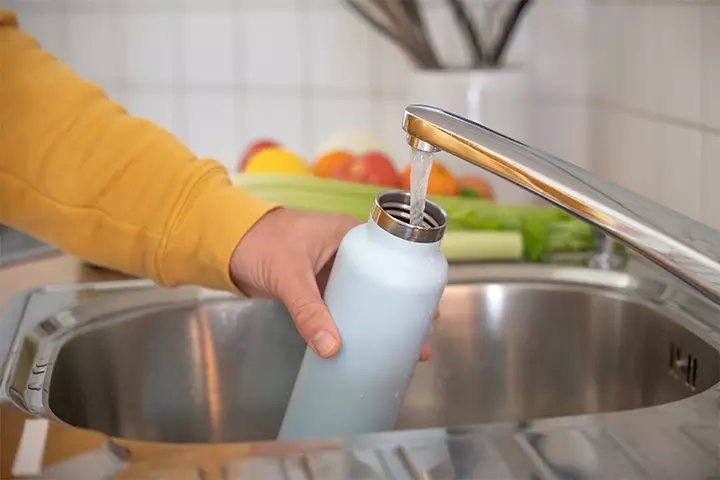
The US Environmental Protection Agency (EPA) regulates tap water quality by testing it for over 90 different contaminants (1). In the majority of locations across the United States, tap water is deemed safe to drink. According to the American Academy of Pediatrics (AAP), if your tap water is safe and pure, you can use it to mix powdered formula and prepare formula milk for your baby (2).
However, if you are unsure about its safety, it is advisable to boil cold tap water to a rolling boil for no more than one minute and then cool the water at room temperature for no more than 30 minutes before use. Boiling tap water is necessary to kill any disease-causing organisms, such as bacteria, viruses, and parasites, present in the water (3). Boiled water can be kept in sterilized, properly sealed containers for two to three or for 24 hours if kept at room temperature out of direct sunlight.
Can You Use Bottled Water To Make Baby formula?
Most others may be ridden by the question ‘Can I use distilled water for baby formula?’ And the answer is yes, you can. If you are unsure about the quality of tap water, you can use boiled bottled water to make baby formula. However, some experts recommend avoiding bottled water as it may contain large amounts of sodium or sulfate. If you use bottled water, check the label, and ensure that the sodium (Na) level is less than 200mg, and the sulfate (SO or SO4) level is less than 250mg per liter (4).
Bottled distilled water is a better alternative since it may contain fewer contaminants than mineral or spring water that usually have added minerals, such as fluoride (5). You will still need to boil it to be on the safe side. Another bottled water option that parents might consider for preparing baby formula is nursery water. Nursery water is bottled distilled water with added fluoride curated especially for babies. While it is quite suitable for babies, nursery water might be expensive and less readily available than other alternatives.
Can You Use Distilled Water To Make Baby Formula?

Yes, you can use distilled water to prepare baby formula (6). Distilled water can be prepared at home by collecting steam in a clean container and cooling it into water (7). You may also use domestic/household water distillers. Since the water is derived from steam, it is usually unlikely to have any contaminants.
You may purchase bottled distilled water available at supermarkets. Pick distilled water meant for human consumption and not those made for industrial use. Distilled water usually does not require boiling. If you suspect possible contamination of bottled distilled water, you may boil it.
Can You Use Well Water To Make Baby Formula?
If the well water is certified as safe by a state-certified laboratory, you may use boiled well water to prepare baby formula. The EPA is responsible for the safety of public water supply, and the safety rules do not apply to privately-owned drinking water systems, such as wells (8) (9). Well water can also get contaminated with toxins from the dirt or water around it. Therefore, it is the well owner’s responsibility to ensure the quality and safety of the well water. If your tap water comes from a well, make sure it is tested regularly.
The EPA does not monitor well water safety, but several state-certified laboratories may offer services to test well water for a fee. You may check with your state or local environmental or health department for more information.
If you are unsure of the safety certification of the well water or suspect the well water might be contaminated and may compromise the formula’s nourishment value for some reason, then choose the tap, bottled, or distilled water to prepare baby formula. Some experts advise against using well water for formula due to the lack of constant monitoring of well water’s safety (6).
 Quick tip
Quick tipWhat About The Fluoride In Water?
Fluoride is a vital mineral that helps prevent cavities and is naturally present in water and certain foods. through soil but the levels are quite low to have any benefit. Drinking water is usually fluoridated. The US Public Health Service recommends drinking water to contain 0.7mg of fluoride per liter of water (10).
Excess of fluoride beyond the recommended value may cause dental fluorosis, whereas too little could pose a tooth decay risk. Both conditions are irreversible. Thus, parents and caregivers should check the fluoride levels in the drinking water and the baby formula. Boiling tap water and home water filters cannot remove fluoride. Knowing the fluoride levels can ensure your baby isn’t getting too much or too little fluoride.
If your infant is exclusively consuming formula mixed with fluoride water, then you can sometimes use low-fluoride bottled water to mix infant formula, to lessen the risk of fluoride excess. Bottled water with low fluoride content is usually labeled as deionized, demineralized, distilled, or purified. You may also use distilled water, which does not contain fluoride (11). Alternatively, you may also consider using liquid low-fluoride baby formulas. It is always good to let your pediatrician know what kind of water or alternatives you are using.
When To Boil Water For Formula Preparation?
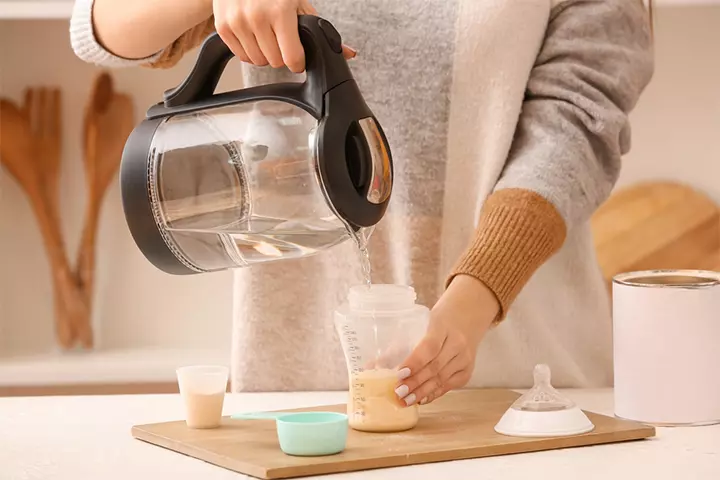
The American Academy of Pediatrics recommends boiling water if you are unsure of the safety of tap water (12). Bottled and packaged distilled water may not require boiling, but it is safe to do so to avoid any risk of waterborne illness. Distilled water is the safest option to use when boiling water isn’t possible (6).
Do note that boiling water neither removes particulate matter, nor does it eliminate dissolved compounds, such as nitrates. If the water is cloudy or dirty, it must be filtered before boiling. Well water tends to have a high level of nitrates, a compound that may increase the risk of methemoglobinemia, a blood disorder, in babies (13). Make sure to know the dissolved compounds in water before boiling and using it for baby formula.
Precautions To Take While Using Water For Baby Formula
Here are some tips to ensure you safely use water for preparing the baby formula.
- Discuss the safest water option with your pediatrician as recommendations and water safety norms may vary as per the location.
- Boil well water, tap water, and bottled water before using it to prepare the formula. Distilled water could be boiled if contamination is suspected.
- Boiling water is necessary even if you are using a home filtration system, such as reverse osmosis.
- Always use clean utensils to boil water and use a sterilized feeding bottle to prepare the formula. You can also use an electric kettle to boil water.
- Avoid boiling water for more than a minute as it could concentrate the impurities in the water. Let the boiled water cool to about body temperature and come to room temperature by setting it aside for 30 minutes. Do not leave the water out for long as it could lead to bacterial contamination.
- Always test the water and formula temperature before feeding the baby. You can drop a few drops on the inside of your wrist to check the water temperature. If it is too hot for your wrist, its too hot to feed to your baby.
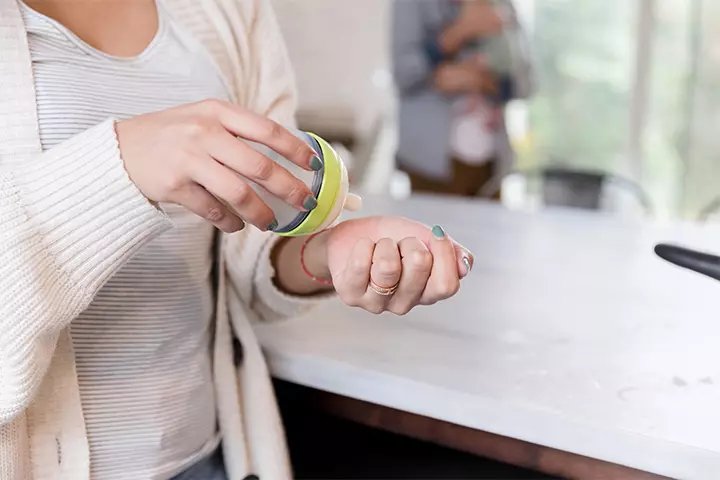
- Mix the quantity of water and formula recommended by the manufacturer or the pediatrician to ensure proper nutrition. Avoid adding excess water or formula powder to prevent underfeeding or overfeeding a baby.
- Handle boiling water carefully as you will need both hands while near a stove; so do not hold the baby while making the formula.
- Discard the prepared formula after two hours and an unused bottle of mixed formula after 24 hours, as it is no longer sterile.
 Quick tip
Quick tipFrequently Asked Questions
1. What happens if you don’t boil water for formula?
Powdered formula is not sterile and may have germs. Water that has not been boiled can also contain harmful pathogens. Thus, boiling the water and preparing the formula in hot water is essential to eliminate any bacteria in the water or formula, which is imperative if your baby is at risk of infections (14).
2. Can you use bottled spring water for baby formula?
No, well or spring water is not recommended for making baby formula. Spring water contains minerals which when used with formula may cause mineral overdose in babies. Nevertheless, speak to your healthcare provider to understand if you can use bottled spring water from a reputable source for making formula.
3. Can I make formula with cold water?
You may prepare the formula with cold water. But remember, cold water or the baby formula may contain bacteria, which can harm babies, especially those under three months, preemies, and ones with weakened immunity. Thus, it is advisable to use hot water to prepare the formula to help kill any microbes and make it safe for the baby’s consumption.
Clean water is an essential component of baby formula. Tap water, distilled water, and bottled water for babies from reliable sources are considered the best water for baby formula and can be opted for based on availability and quality. Generally, tap water in the US is considered safe to prepare infant formula. However, boil the water before use if you are unsure whether it is safe. Additionally, you can get your local water supply tested to determine water quality. Whatever safe water choices you make, remember to alternate between different water types to mitigate the risk of excess or less fluoride.
Infographic: How To Ensure Water Safety For Baby Formula While On The Go
Ensuring water quality when traveling can get tricky for parents. Understanding your woes, we bring you an infographic that shares tips on water safety when traveling. If you are a frequent traveler, keep this information handy to make sure you do what’s best for your baby.
Some thing wrong with infographic shortcode. please verify shortcode syntax
Illustration: Water For Baby Formula: Which Type Should You Use?

Image: Dall·E/MomJunction Design Team
Learn which type of water is best for baby formula in this informative video. Get the facts on the safest and healthiest water for your baby.
References
- Water Quality & Testing; Centers for Disease Control and Prevention
- Rose Pastore, Are you preparing your baby’s bottles correctly?; American Academy of Pediatrics
- Making Water Safe in an Emergency; Centers for Disease Control and Prevention
- Drinks and cups for babies and young children; NHS UK
- Bottled Water Fact Sheet; Safe Drinking Water Foundation
- Bottle Feeding Formula Preparation; Nationwide Children’s Hospital
- Distillation For Home Water Treatment; Michigan State University
- Well Water Safety; Centers for Disease Control and Prevention
- About Drinking Water; Centers for Disease Control and Prevention
- “Preliminary Regulatory Impact Analysis Initial Regulatory Flexibility Analysis Unfunded Mandates Reform Act Analysis; USFDA”
- Community Water Fluoridation Frequently Asked Questions; CeCenters for Disease Control and Prevention
- How to Safely Prepare Formula with Water; American Academy of Pediatrics
- Where We Stand: Testing of Well Water; American Academy of Pediatrics
- Preventing Cronobacter in Infants; Centers for Disease Control and Prevention
- Safe Water for Mixing Infant Formula; HealthLink BC
- How to make up baby formula; NHS
Community Experiences
Join the conversation and become a part of our nurturing community! Share your stories, experiences, and insights to connect with fellow parents.
Read full bio of Seeemaa Budhraja
Read full bio of Swati Patwal
Read full bio of Rohit Garoo
Read full bio of Ghazia Shah






